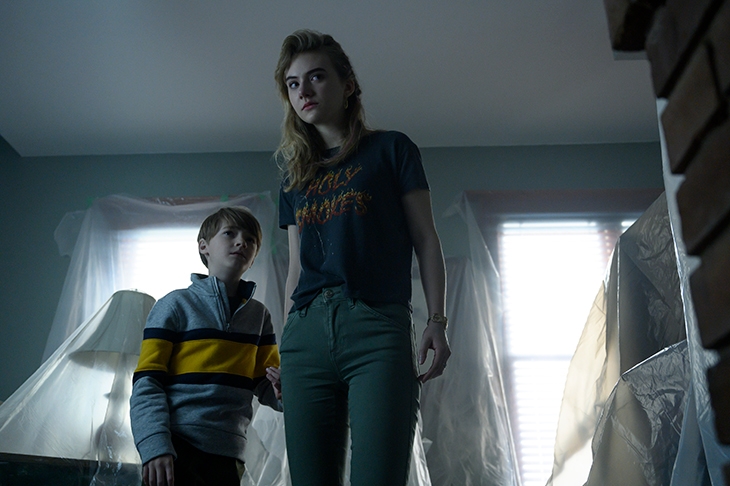One of my perpetual gnawing terrors is that I’ll recommend a series that looks initially promising but turns out to be total rubbish, meaning I’ll for ever have thousands of viewers’ wasted lives and disappointment on my conscience. But my even greater fear is that I’ll peremptorily condemn something after one or two episodes which subsequently reveals itself to be a near-masterpiece.
This almost happened with Locke & Key (Netflix). ‘You realise I’m watching this on sufferance. The second you’ve seen enough to review, we’re moving on to something else,’ declared the Fawn. And I could sort of see her point. Not only does it take a while to get going but it feels like a mash-up of every supernatural-for-teens drama you’ve ever seen, from Buffy the Vampire Slayer to Harry Potter. The scenarios too are overfamiliar to the point of cliché: big, spooky mansion with creaky iron gates and a mysterious past; awkward teenagers trying to settle in to a new high school where they are mocked for their weirdness by the cool kids; remote, distrait parents who are totally ill equipped to understand all this eerie, dark magical stuff intruding into their lives.
You’ll be left replaying its scenes over and over again in your mind, wishing they’d hurry up and make the sequel
Stick with it, though. It just gets better and better. Darker and darker too, which I think is a function of the fact that it began life as a comic series by Joe Hill and Gabriel Rodriguez. Comic writers are different from normal writers: they’re often weirder, definitely less bound by convention and have to think much more visually. Also, as my friend Mark Millar says, ‘Two interesting things have to happen in each chapter. So you get a movie with at least 12 interesting things on average, which is 11 more than most movies.’
This relentless inventiveness is why I think I prefer Locke & Key to Stranger Things, a franchise that went an awfully long way on its charm, its delightful cast of characters, and its retro nostalgia, but which never quite delivered on plot coherence. Locke & Key really does deliver: there’s not a spare ounce of flesh on any of the later episodes; you’re constantly being fed new disturbing or surprising information, you’re almost always on the edge of your armchair. Yet though the plot is very tight — and the blacker-than-your-hat twists at the end deliciously Nightmare on Elm Street — still the characters are mostly intriguing, plausible and well developed.
The premise is that the Locke family of Mom and three kids (jaded older male; stroppy teenage female; cute younger sibling Bode — Jackson Robert Scott playing the Elliott-from-ET role — move to coastal Massachussetts to the spooky ancestral home of Dad (who unfortunately has been murdered by a psychopathic brat at the school where he teaches). Secreted within the home are a number of magical keys, each of which grants the possessor extraordinary powers: travelling wherever you wish, turning you into a ghost, looking inside your unconscious, etc. It all feels like tremendous fun at first — but then the horror begins.
Sometimes, you cannot but gasp at just how horribly wicked the baddies are — especially the outrageously attractive, impossibly evil Dodge (Laysla De Oliveira). Besides being invigorating this is also a relief because it cuts through the cosy winsomeness of the high-school romance and the melancholy of the bereaved-family-come-to-turns-with-loss scenes. Also, it stops you feeling embarrassed with yourself for watching a series presumably designed for teens: this is proper, sophisticated adult stuff, far too edgy and clever to be wasted on kids — or so you can tell yourself.
Sure it has its flaws. The entire plot hinges, for example, on one character behaving with such implausible and culpable stupidity that you may feel they entirely deserve their almost unimaginably ghastly fate at the end. But its inventive brilliance far outweighs its weaknesses. Long after you’ve finished watching, you’ll be replaying its scenes over and over again in your mind — and wishing they could hurry up and finish making the sequel.
In the meantime, I’ve trying out season one of Altered Carbon (Netflix), a sci fi series — based on a novel by Richard K. Morgan — that is a cross between hard-boiled detective fiction and Blade Runner. So far I’m liking the outrageously good-looking, ludicrously omnicompetent anti-hero Takeshi Kovacs (Joel Kinnaman) and some of the amusing futuristic conceits (the Raven, a living hotel inspired by Edgar Allan Poe, which doesn’t merely satisfy your every desire, but wipes out all your enemies; virtual interrogation in which you can be tortured to death endlessly in a billion and one ways, and revived each time, till you go mad). But I could quite easily do without the portentous poetic aphorisms and the elusive guru character Quellcrist Falconer, who presumably holds the key to many mysteries but just strikes me as an unconvincing black female version of Yoda.







Comments